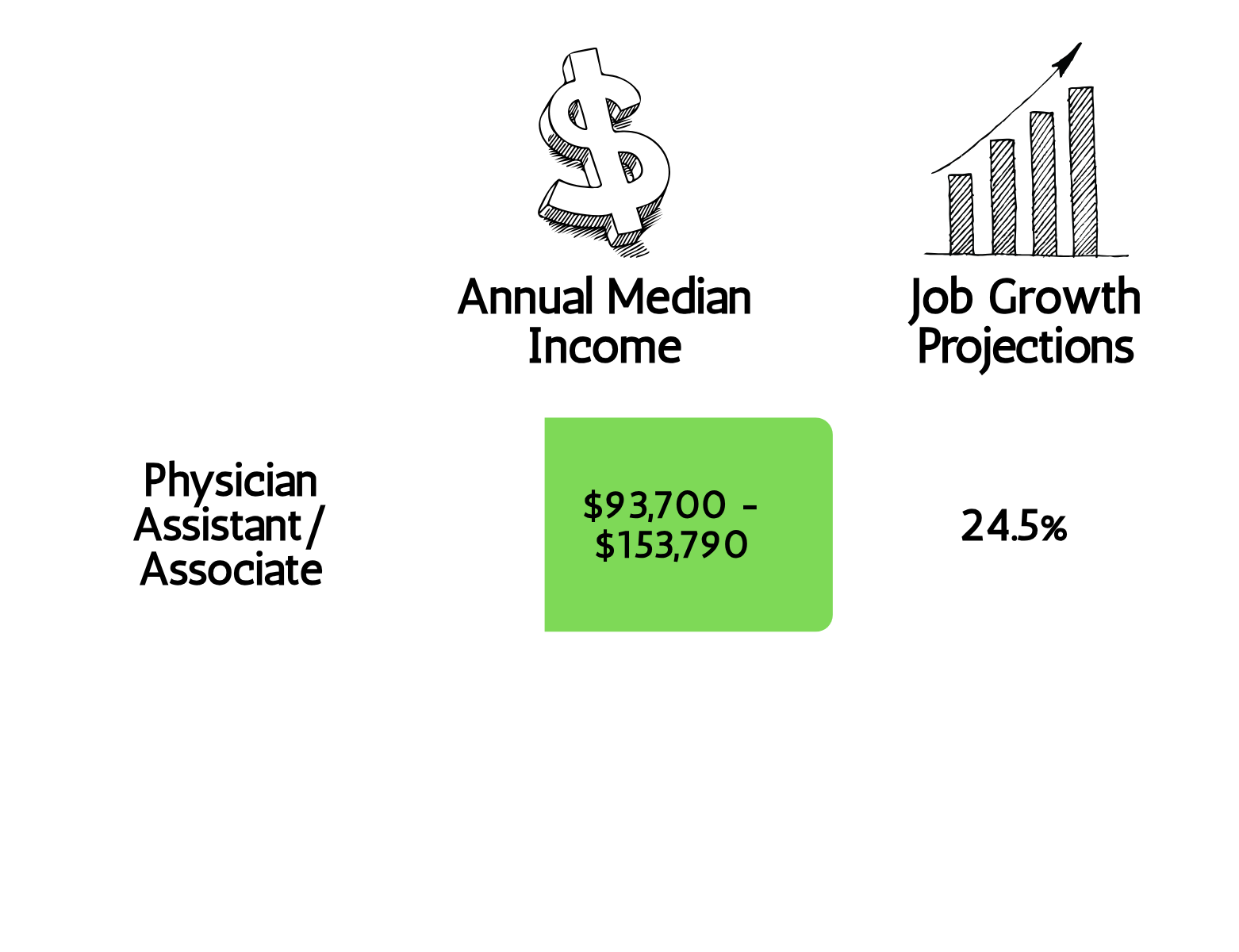Physician Assistant* Careers:
The Medical Side of Behavioral Health
Have you thought about a career in medicine that includes mental and behavioral health? Do you enjoy understanding how science, medications, and treatment all play roles in providing support to people in need? If so, becoming a Physician Assistant (PA), specializing in behavioral health, might be the perfect fit for you!
PAs are integral in helping people with mental health needs by listening to their concerns, providing support, referring them to therapists, and prescribing medication when needed. They work closely with doctors in primary care and psychiatric settings to ensure patients are getting their needs met.
*Physician Assistants are often referred to as Physician Associates in some communities; the two titles can be used interchangeably.
Is Working as a Physician Assistant* Right for You?
Learn More About Physician Assistant/ Associate Careers:
What is a PA? - AAPA
Ohio Association of Physician Assistants
Explore Healthcare Careers - Mayo Clinic
Physician Assistants: US Bureau of Labor Statistics
Physician Assistants (Career OneStop)
Physician Assistants (O*Net Online)
Learn More About Licensure:
State Medical Board of Ohio
Become a PA - AAPA
*Please note that the job recommendations listed throughout this page will vary by agency and county, as some may require additional training or licensure.
Your Path to a Career as a PHYSICIAN ASSISTANT/ ASSOCIATE
What does it take?
Get Educated
Get Experience
Get Licensed*
Get Ahead
*Licenses are offered by the State of Ohio or other National Organizations. They show you’re a trusted professional in the field.
Income varies and is based on role, location, experience, education, and licensing/credentials. Job growth projections are for 2023-2033. Ohio LMI
Salary ranges are based on what’s currently available through Zip Recruiter, Indeed, Career One Stop, or Salary Expert.

Get more info in the FAQs
PHYSICIAN ASSISTANT/ ASSOCIATE
PROFESSIONALS - FAQ
-
Make a Difference: Help people improve their mental health and well-being.
High Demand: Mental health professionals who can prescribe medications are needed across Ohio.
Teamwork: Work closely with doctors, nurses, and therapists.
Variety: Every day brings new challenges and opportunities to learn.
Good Salary: PAs earn competitive wages.
As a PA in behavioral health, you'll have a rewarding career developing a strong relationship with your patients and helping others, with opportunities for growth and learning.
-
With a master's degree or higher:
Physician Assistant/Associate (PA)
PAs work directly with patients in hospitals, primary care, clinics, or mental health centers. You diagnose mental health conditions, create treatment plans, and support patients with medications and care. PAs must work under the supervision of a qualified physician or psychiatrist and have some restrictions on the types of medications they are permitted to prescribe.
Research Assistant (PA)
Although not as common as working in direct care, some PAs engage in research, medical clinical trials, and develop treatment or policy recommendations. [Learn more about Research careers→]
Pharmaceutical Sales
PAs can support the behavioral health field by providing clinical insights, educating peers about medications, and serving as advisors.
Other job titles you may see:
Physician Assistant/Associate - Behavioral Health
Physician Assistant/Associate - Psychiatric Mental Health
Psychiatric Physician Assistant/Associate
Physician Assistant/Associate - Inpatient Psychiatry
Physician Assistant/Associate - Outpatient Psychiatry
A career as a PA offers various paths and settings from patient care to research and education.
-
Assess Patients: Talk with patients to understand their mental health needs.
Diagnose Conditions: Identify issues like depression, anxiety, or substance abuse.
Develop Treatment Plans: Create strategies to help patients feel better.
Prescribe Medications: Provide medicines when needed.
Collaborate with Teams: Work with other healthcare professionals to provide the best care.
PAs in behavioral health play a key role in diagnosing and treating mental health conditions, often with medication, and working closely with patients and healthcare teams.
-
Hospitals
Primary Care
Private Practices
Inpatient and outpatient mental health centers
Clinics
Schools
Community Centers
Telehealth
PAs work in various settings, making mental health services more accessible to those in need.
-
Children and Teens: Help young people with anxiety, ADHD, bullying, or family stress by offering support and treatment.
Adults: Support individuals facing depression, trauma, substance use, or pressures from everyday life with therapy and medication management.
Older Adults: Address mental health concerns related to aging, such as memory loss, loneliness, or grief, while promoting emotional well-being.
Underserved Communities: Provide care in areas with few providers, helping people access mental health services they might not otherwise receive.
People in Crisis: Offer fast, compassionate care in emergency rooms, clinics, or crisis centers during mental health emergencies.
Veterans and Military Families: Assist those coping with PTSD, stress from deployment, or the transition back to civilian life.
People with Chronic Illness or Disability: Support the emotional and psychological side of living with long-term health conditions.
PAs serve diverse populations across the lifespan
-
To become a PA in Ohio:
Bachelor's degree: Earn a degree in a related field. Ensure all prerequisites are completed before applying to preferred programs.
PA Program: Complete a master's program accredited by the Accreditation Review Commission on Education for the Physician Assistant (ARC-PA).
Certification: Pass the Physician Assistant National Certifying Exam (PANCE).
-
In Ohio, to practice as a Physician Assistant:
License: Obtain a license from the State Medical Board of Ohio.
Certification: Maintain certification through the National Commission on Certification of Physician Assistants (NCCPA).
Continuing Education: Complete ongoing education to stay current.
*Ohio PAs will soon be able to practice across state lines through the PA Compact.
Click here to learn more about licenses, credentials, and certifications.
Disclaimer: The information provided on this website is accurate to the best of our knowledge at the time of publication. If you notice any errors or outdated information, please contact accounts@mhaadvocacy.org so we can make the necessary corrections.


